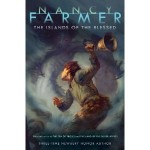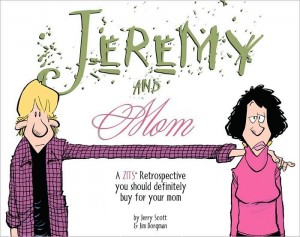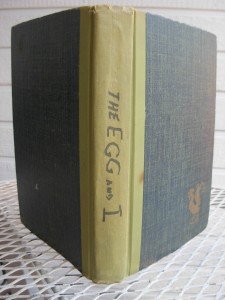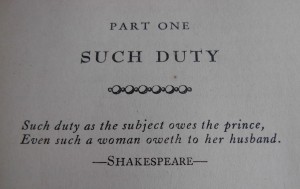
By Laura Grimes
We’re traveling, we pack of five breathing each other’s air and bumping inside each other’s heads. We eat the same food. We stop from spot to spot, sightsee, and mere snippets intermingle, weave together something anew and haul us along.
Everywhere we go we pick up words and take them with us. They lift us. They quiet us. We break bread with them. We swirl wine with them. They hang in the air among us.
Our books go from suitcase to table to car to kindle to stereo to suitcase to car to lap to bed.
Each time, bits let loose. Literary crumbs pinch and mold into a new story, unique and unashamed. It becomes our own literary travel journal. Jumbled. Weird. Scattered. And somehow cohered.
*
 When The Large Smelly Boys bicker in the car, I hit play and they magically silence before the almighty audio book. Nancy Farmer, god bless her. Past summers we plowed through her The Sea of Trolls and The Land of the Silver Apples. Just to be safe, we have along her The Islands of the Blessed on iPod, CD and hard copy. Thank heavens, because we’ve used all of them. In less than a week, the hard copy was devoured by two members of the Scatter Family.
When The Large Smelly Boys bicker in the car, I hit play and they magically silence before the almighty audio book. Nancy Farmer, god bless her. Past summers we plowed through her The Sea of Trolls and The Land of the Silver Apples. Just to be safe, we have along her The Islands of the Blessed on iPod, CD and hard copy. Thank heavens, because we’ve used all of them. In less than a week, the hard copy was devoured by two members of the Scatter Family.
*
We embody the Zits cartoon books in the backseat. I am totally freaked that those two cartoonists know everything that happens in our house. They live with us. They have spy cameras. Something. Tipping forward the fridge to empty the entire contents into a backpack? Our house! Using a steamshovel to clean out a teen’s bedroom? Our house! The mom in Zits fixes her teen son’s collar and his brain bubble says, “Everything my mom touches turns to dork.” Freaky!

*
The Scatter Family popped into a shop the other day, a quirky place at the coast full of antique and battered books. Like laced candy, odd, old-timey covers lured us and then captivated us, spellbound and addicted. They hold their own against time and trends and the overflowing sweep of pop culture, not unlike the windswept trees that lean against the coast cliffs and staunchly defy the elements.
Past the big-name mysteries lying in neat rows on a table near the entrance, past the kids section with two copies of Eight Cousins by Louisa May Alcott and a Hardy Boys book (where we confirmed for the second time a trivia question that had been nagging us — their first names are Joe and Frank), I spied a copy of The Ambassadors by Henry James.
 I found it prone in a stack of books sandwiched between Women in Love by D.H. Lawrence and Pigs in Heaven by Barbara Kingsolver.
I found it prone in a stack of books sandwiched between Women in Love by D.H. Lawrence and Pigs in Heaven by Barbara Kingsolver.
It’s a Signet Classic with yellowed pages and a dated illustration on the cover. Copyright 1960. A tiny sticker on the front says $2.95.
The inside back cover, brown on the outside fading to light, is smacked in the middle with a green stamp:
PAPERBACK PARADISE
Quality Resale Books
Sun Plaza South
9024 103rd Ave.
Sun City, Arizona 85351
I already have several editions, but the strange stamp sealed the deal. Or maybe it was the strange sandwich. I didn’t care.
I remembered how I used to carry around an odd, old copy of the book, and like a magnet, it drew people to me, asking about it and sparking conversations. A book obsessed with manners and minute social interactions spawned other social acts that spiraled in tendrils their own way.
I got on a bus to go home one evening. I was lost in thought in my book when I felt someone peering over the seat in front of me. It was a friend with a sly smile.
“What are you reading? That looks really old.”
I explained what it was about. Or tried to. I’ve never figured out how to distill a book by Henry James into a simple plot summary. I might as well try to hack down a runaway squash vine. It was easier to change the focus and ask, “What are you reading?”
He held up his book. It was a giant hard copy of The Path Between the Seas: The Creation of the Panama Canal, 1870-1914 by David McCullough.
He explained how the engineering firm he worked for had just been awarded a contract that had something to do with the canal.
I pointed out how he had no jacket. No bag. The only thing he carried was that giant book.
On another day, I was standing against a wall reading the same beaten book while waiting for a train when I sensed someone next to me. I looked up to see another friend with a sly smile standing exactly like me with a book propped open.
“What are you reading?” he laughed and pointed almost accusingly. “That looks like it’s from the last century.”
“It is.” I tried to explain the book again, mangling it more and more as I became keenly aware that plotwise it sounded like the dullest book on the planet. It’s not easy to explain that you are thick into hundreds of pages of obscure and mostly outmoded social etiquette. It was much easier for both of us just to dissolve into chuckles.
“What are you reading?”
I think it was a spy thriller. We boarded the train and he told me how his son snitches his daughter’s cologne and how he doesn’t leave the house in the morning until his shirts are layered just so, tucked in in some places but not in others and more than one pair of suspenders are up, down, clamped to this and that, his hair is slicked and he stinks to high heaven.
I told him I would be thrilled if my son just showered.
I think that was two summers ago. I’m still waiting for my son to shower.
*
Words from The Islands of the Blessed, Chapter Twenty, filled the van:
“I shall never marry,” Thorgil said scornfully. “Shield maidens have all the power and status of men. If they wed, they lose it. They can no longer go a-hunting or bring home fine plunder. They are bound to the house, cooking, cleaning, and chasing after smelly brats. There is no honor in such a life.”
*
 Back at the quirky used bookstore, another book caught my eye, as much for the title as for the crude lettering and the beat-up cloth cover. The Egg and I was written unevenly with a Sharpie across the dull lime-green spine. I have my own copy of the book already, on my nightstand, at the top of the stack. A newer paperback.
Back at the quirky used bookstore, another book caught my eye, as much for the title as for the crude lettering and the beat-up cloth cover. The Egg and I was written unevenly with a Sharpie across the dull lime-green spine. I have my own copy of the book already, on my nightstand, at the top of the stack. A newer paperback.
I flipped open a few pages of this version: Copyright, 1945, by Betty MacDonald.
I flipped a few more pages:

I turned the page to the opening chapter and the first sentence:
1
AND I’LL BE HAPPY
Along with teaching us that lamb must be cooked with garlic and that a lady never scratches her head or spits, my mother taught my sisters and me that it is a wife’s bounden duty to see that her husband is happy in his work.
*
In The Islands of the Blessed, Chapter Twenty-Two, a group of characters is trying to convince Schlaup, the giant half-troll, that he needs to marry Mrs. Tanner, a despicable conniver:
“I know how these things are done,” Schlaup burst out suddenly. “Just because I’m not smart doesn’t mean I don’t know how marriages happen. First, the troll-maiden asks you to dance. She brings you presents: elks, bears, that sort of thing. Then she weaves you a cloak of spidersilk, which she has pulled herself from the spinnerets of a giant spider. Lastly” — he blushed deeply, turning a bright orange — “she drags you into her cave. The next morning everyone looks to see how many scratches she’s left on your browridge.”
*
The Scatter family landed in Ashland. We will take in nine plays in six days. The Large Smelly Boys, for all their troll-like behavior, love going to Ashland. They burp and bicker and outstretch the patience of everyone in the family, but a few nights back when one of them popped in a video of Twelfth Night (1996 version, directed by Trevor Nunn) to prepare for the play, they went still in rapt attention.
The Duke Orsino, Act 1, Scene i:
O, when mine eyes did see Olivia first,
Methought she purg’d the air of pestilence;
Twelfth Night was the first play the LSBs ever saw at the Oregon Shakespeare Festival, in 2005. They have begged to go back ever since.
We were nervous how that first trip would go. We were taking a big chance. Could they stay up? Would they behave? Would they embarrass us? Mr. Scatter had much more than his fatherly reputation at stake.
Feste/Clown/Fool, Act III, Scene i:
No, indeed, sir; the Lady Olivia has no folly: she will keep
no fool, sir, till she be married; and fools are as like husbands
as pilchards are to herrings, the husband’s the bigger; I am,
indeed, not her fool, but her corrupter of words.
It was opening night, and, fortunately for us and the festival, the show was charming and delightful. The 11-year-old-at-the-time was completely absorbed and blissfully unaware how loud he was laughing out one end and making noises out the other, which resonated and vibrated on the metal seats all the way down the row. I know, and I was three seats away.
Concerned, I watched the people around us, but they were laughing as much at him as they were the show. At intermission (we often call it halftime), I watched a young man seated behind the LSB watch him, text, watch him, text, while smiling amusingly. After halftime, the 7-year-old-at-the-time fell soundly asleep on my shoulder and snored softly.
Feste/Clown/Fool, Act I, Scene v:
Wit, and’t be thy will, put me into good fooling! Those wits
that think they have thee do very oft prove fools; and I, that am
sure I lack thee, may pass for a wise man. For what says
Quinapalus? Better a witty fool than a foolish wit.
I felt like we were our own little drama, the venerable theater critic and his motley mob. Sir Toby Belch and Feste the Clown were on stage and The Scatter Family was in the audience.